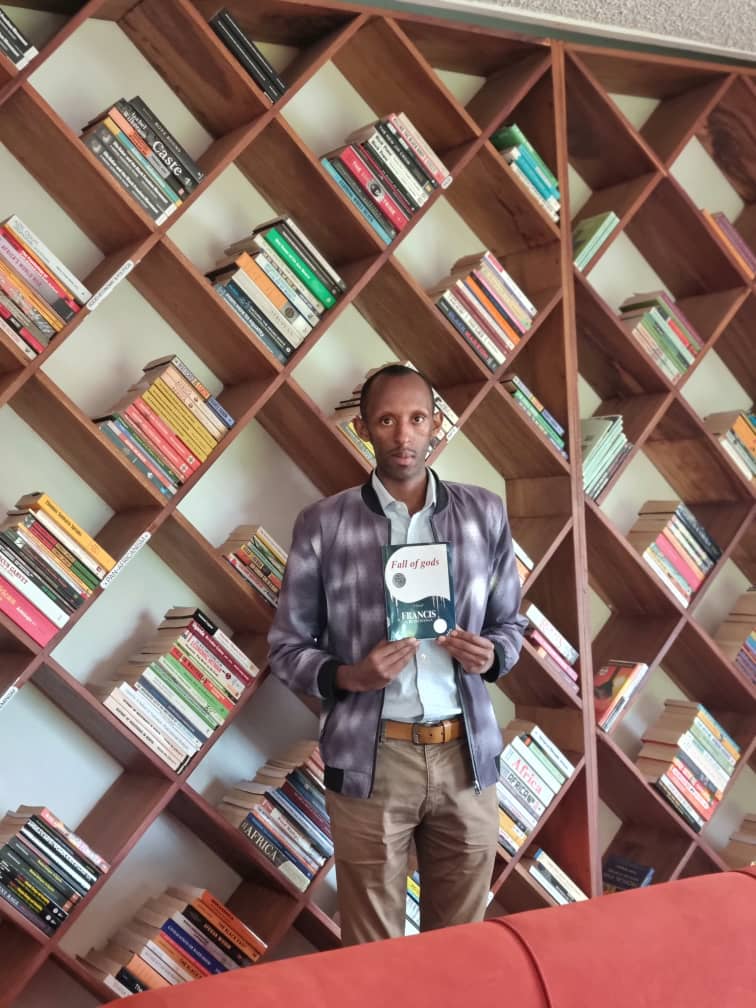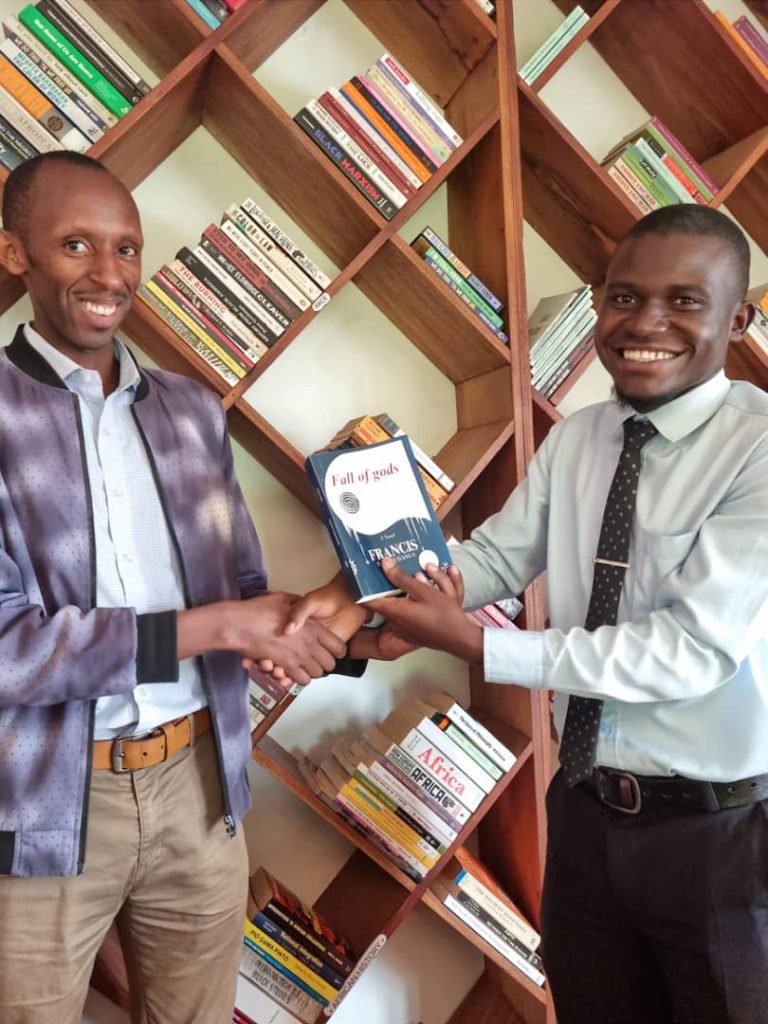Francis S. Byaruhanga is a talented emerging writer from Kigali. His journey as a writer began in 2014 when he made his debut in the global writing competition titled ‘Economic Growth and Development Advantages.’ Since then, he has been honing his craft and has recently achieved a significant milestone with the release of his first novel, ‘Fall of Gods,’ in May 2023.
In this conversation, Francis is joined by Patrick Nzabonimpa (Tom), a Rwandan writer and the Country Coordinator of WSA-R.
Patrick: Thank you, Francis, for joining me in this conversation. I appreciate your participation. First and foremost, let me extend my heartfelt congratulations on the release of your debut novel, Fall of gods. I would like to delve into the choice of this particular title amidst the various options you must have considered. Could you please share your reasons behind the selection?
Francis: The title Fall of gods is a metaphorical interpretation representing the change from bad to good and an indication of the road to civilization for conservative societies. In the book, I depict the ‘Mubari people,’ who strongly adhere to witchcraft and spirit worship and are later obliged to change their morals, thus getting civilized. After considering several titles, I reached a point where I said, “This must be final.”
Patrick: Interesting! I, too, tend to come up with various titles before settling on one. It’s usually a challenging process. So, how did you come up with the idea for this novel, and when was that?
Francis: Ah, interesting. The idea came to me in early 2018, and during that period, I found myself greatly inspired. Firstly, there were numerous divorce cases around, many of which were triggered by property-oriented marriages, which I discuss in the middle of the book. Additionally, I wanted to showcase the power of women in our societies.
Patrick: I love what sparked your inspiration. I also witness property-oriented or materialistic marriages as well as the power of women in our society. Could you elaborate on how you depict these specific themes in your novel? Additionally, I am curious to know if any of the scenes in your book were inspired by real-life events.
Francis: That’s a great question! Although there are many fictitious elements in my book, there is a true event behind the story, especially the part where I discuss divorce. When I started writing, there were numerous cases, and there is indeed a particular case that inspired parts of the story. Throughout the book, Princess Muganwa is the central character, representing the impact of women in our global society. I describe her as a woman of strength, unyielding, and blessed with indescribable beauty which she sometimes uses as a tool to impart her influence. She is highly educated and well-versed in Western education, driven by the desire to impact and change her society, starting with her husband. However, as a side effect of Western education, she also advocates for white cultural imperialism and introduces new norms like divorce and feminism. This seemed strange and brought conflict to the conservative elders who didn’t want to see the erosion of their culture.
Patrick: Fascinating! Within the narrative, Princess Muganwa and Gihanga also encounter ideological differences that eventually pose obstacles to their relationship. Their love story serves as a driving force behind the novel’s entire plot. What underlying message were you aiming to express through this captivating tale?
Francis: Yes, the two budding lovers, Gihanga and Princess Muganwa, drive the entire plot of the story. First of all, it’s a story of romance, carrying the message of love. Love is a powerful tool in our society; it brings harmony to the very core of the social fabric. So, the main message is to instill the virtues of love and impact our societies positively. Furthermore, Gihanga and Muganwa are constantly pulled apart by their differences, but the magnetic power of love brings them together again and helps them triumph.

Francis S. Byaruhanga with a copy of his novel ‘Fall of gods’.
Patrick: I love that! Throughout the love story of Princess Muganwa and Gihanga, the characters exemplify remarkable patience and resilience, which ultimately paves the way for their triumph. Do you believe these two qualities are often absent in contemporary relationships? And how do they impact one’s romantic life?
Francis: Yes, the two elements of patience and resilience are lacking in today’s relationships due to various factors. Nowadays, many relationships easily break over trivial matters, both in marriages and in regular relationships. This is because people lack patience in their relationships. Additionally, they often imitate the negative behaviours they see in movies and from Hollywood celebrities. These intermittent breakups in relationships have a strong impact though. What people don’t realise is that sometimes, these breakups can leave emotional scars similar to those from divorce. In modern relationships, where sex and strong emotional attachments are often involved, separated couples may find it hard to forget each other and may even reunite when both couples are in marriages for instance, as I indicated in the book. These factors affect future love lives and can contribute to the increasing divorce rates.
Patrick: Fascinating! I’ve observed how the storyline of your novel offers profound insights into the topics you’ve just discussed. The story takes place in ancient Rwanda, encompassing the Kingdoms. Would you consider classifying it as historical fiction? Furthermore, what influenced your decision to select this particular setting?
Francis: Yes, Fall of gods is entirely historical fiction. I chose such a setting because I wanted to bring back forgotten histories. For instance, right away, the names of the book’s characters are those from the past, like Gihanga and Muganwa, which are both royal names. There are other instances where I use names like Mbwana ya Bidaga and Muhinda ya Rwamwejo, which Rwandan parents no longer name their children. Additionally, the place Mubari is an ancient chiefdom which currently covers part of Gatsibo and Nyagatare districts in the Eastern Province of Rwanda and another part of Tanzania. I also use reference of places like Gisaka kingdom, which date back to the pre-colonial periods, but I hint on the land of Thousand Hills representing the present Rwanda. So I try to infuse the past and present in unison. I’m inspired to showcase the life, traditions, and how our parents and grandparents lived.
Patrick: I can certainly attest that delving deeper into Fall of gods not only involves exploring the lives of people during that era but also immersing oneself in their lifestyle. I recall the moments when I was engrossed in crafting the initial draft of my forthcoming novel. Certain scenes evoked profound emotions within me and left a lasting impact. Among them, there was one scene that, over time, grew to become my absolute favourite. Francis, can you also reflect on a specific scene from your novel that profoundly affected or challenged you during the writing process? How did you experience it?
Francis: (Laughs) There is, of course, a scene that touched me. Actually, there are many. One instance is when Princess Muganwa meets her childhood friend, Muhinda ya Rwamwejo, and she is caught in a dilemma of either continuing with her husband or abandoning her former lover, with whom she shared almost everything—the good and the bad, the memories of their school days, and the joys of storytelling together. Another instance is the pain experienced by Muganwa’s father, Kabeja, who is also depicted as the ruler of the Mubari people, when he discovers that his daughter cheated on her husband. This act caused disasters, hunger, and the deaths of livestock, which angered the king and Muganwa’s father. Muganwa was his father’s only child, and he held high regard for her masculine abilities, often repeating regretfully, “I wish she were a boy” whenever he saw her. However, with Muganwa breaking the royal codes and engaging in fornication with her childhood boyfriend, she appeared as a disgrace in her father’s eyes. I realised that parents experience a lot of pain when disappointed by their children.

The author handing a copy of ‘Fall of gods’ to one of his clients.
Patrick: Wow! It’s amazing how you grasp the depth of a situation when writing about it. I often see writing as one of the greatest instruments for critical thinking. So, Francis, how long did it take you to write and publish Fall of gods? Did you find the process to be smooth sailing or did it present challenges?
Francis: The process was not easy at all; it was quite challenging. The writing culture is new in Rwanda, and naturally, you have to pave the way. The project of writing the novel lasted almost a full four years.
Patrick: That must have been both challenging and exciting! So, how has the feedback been so far?
Francis: The feedback has been quite encouraging, and the majority of people appreciated the work including my friends and family. The feedback they gave me indicated that they were surprised by move. It’s as if they were not expecting me to come up with such a milestone of writing a book. (Laughs) Others started asking how old I am. I just knew they were surprised by how I came up with the idea of writing a novel.
Patrick: (Laughs) That’s great! As we wrap up this conversation, do you have any advice or words of wisdom for aspiring authors who are just starting their writing journey?
Francis: Absolutely, Patrick. Writing is not an easy task for everyone, but with resilience, they can achieve it.
Patrick: Nice one! I couldn’t agree more. Thank you so much for the conversation. I appreciate your time.
Francis: Thanks, Patrick, for your time.
To order a copy of ‘Fall of gods’, you can contact Francis Byaruhanga directly on +250782884475



